How Will Wildfires Affect the Tourism Industry in Turkey & Italy Following COVID Lockdowns?
04:39 GMT 03.08.2021 (Updated: 17:09 GMT 12.04.2023)
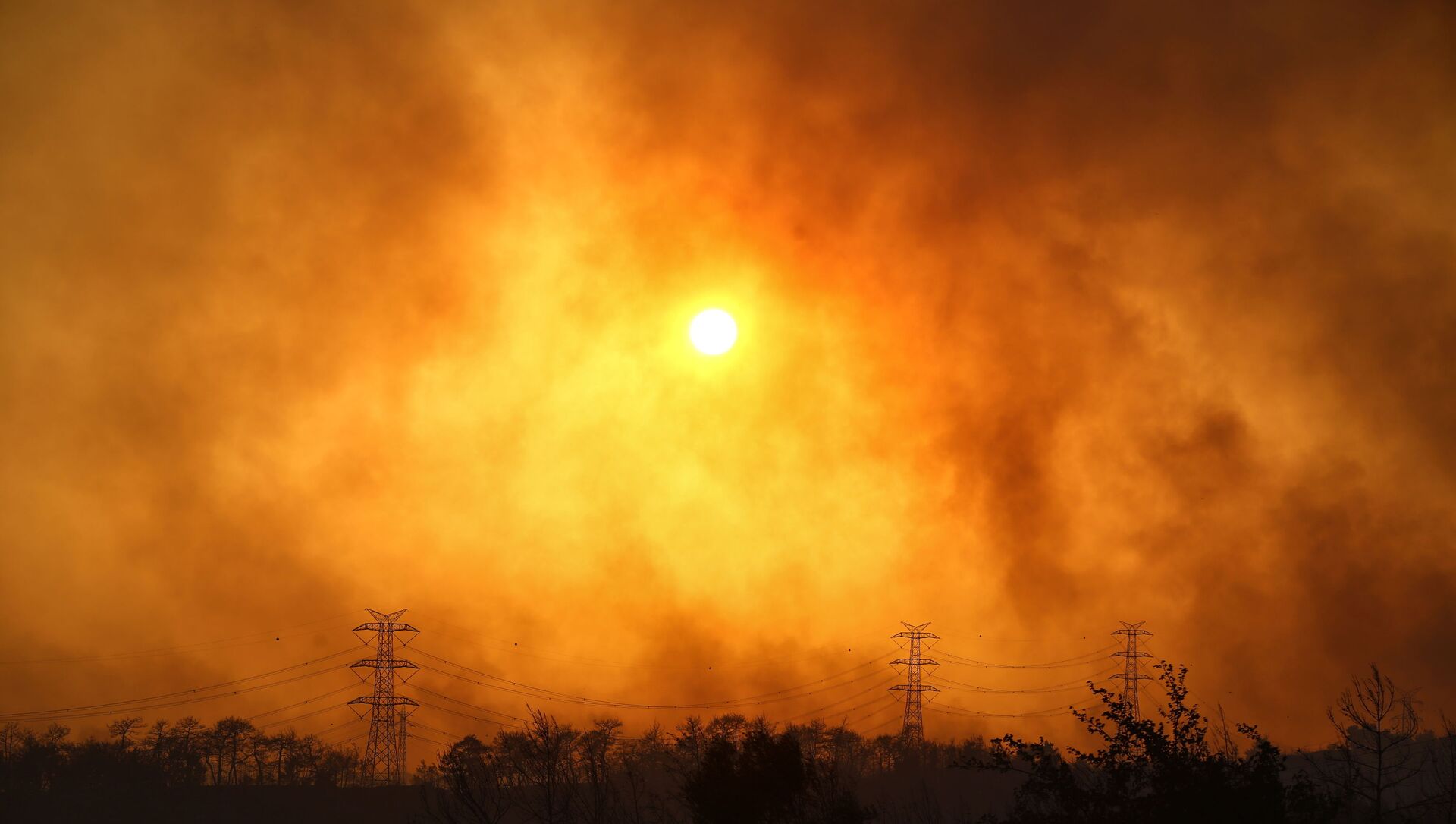
© REUTERS / KAAN SOYTURK
Subscribe
The total impact of wildfires on the economy of Turkey and Italy has yet to be estimated, but tourism was hurt following the slump in revenues due to the COVID-19 pandemic, according to Turkish and Italian observers.
Devastating wildfires have engulfed southern Europe, including Turkey, Italy, Spain and Greece, which were hit by a severe heat wave with temperatures soaring above 40 C (104 F). The deadly blazes have claimed the lives of at least eight people. Hundreds of tourists have been evacuated to safety from the countries' sea resorts, which had just started to revive after protracted COVID-related restrictions.
Turkey Suffers Worst Wildfires in Past Decade
"The wildfires are mostly in the most touristic areas near the Aegean and Mediterranean Coasts of Turkey," says Dr. Ahmet Oguz Demir, director of the International Creative Economy Research Centre, founded by Istanbul Commerce University. "These areas are the most popular destinations for both domestic and international visitors. After experiencing huge troubles last year due to COVID-19, the tourism industry had high expectations from this year, especially in July and August as high season periods. But the trouble with the wildfires will very much influence the tourism revenue in August for Bodrum and Marmaris, the main tourist destinations, even though not the whole region is under wildfire."
Tourism income decreased by 40.2 percent in the first quarter of 2021 due to the pandemic, totalling just $2.4 billion, according to TurkStat. Between April and June 2021 this figure grew to $3.3 billion, promising long-anticipated growth during the high season, which is likely to be disrupted by the current crisis, according to the academic.
In addition to this, a great number of people employed in forest-related industries production and agriculture have been affected, says Can Selcuki, managing director of Istanbul Economics Research, a polling company, and a board member of EDAM, an Istanbul-based think tank. This will obviously place a further burden on Turkey's economy, but it's difficult to estimate the impact right now, he notes.
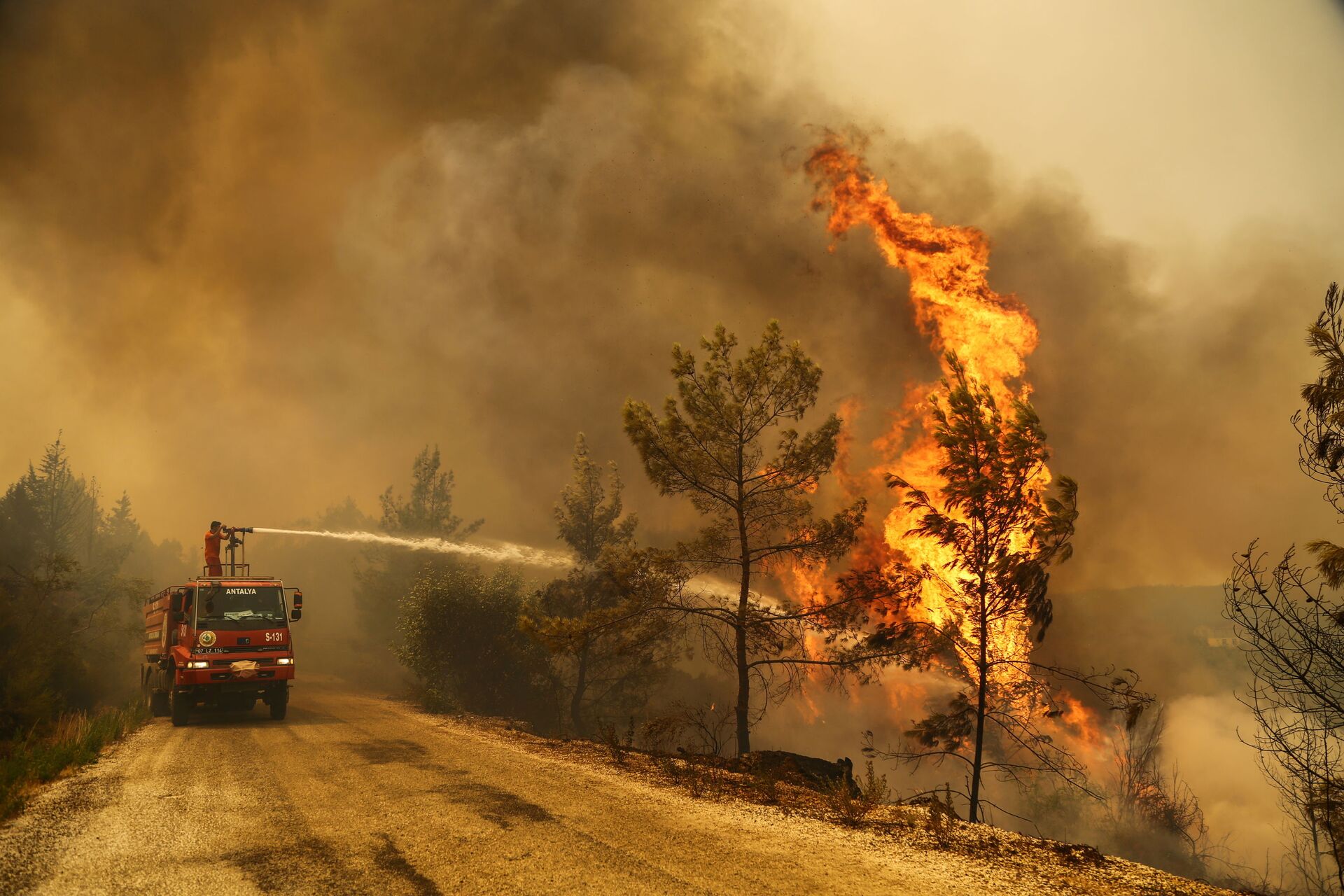
A firefighter extinguishes a forest fire near the town of Manavgat, east of the resort city of Antalya, Turkey, July 30, 2021. REUTERS/Kaan Soyturk
© REUTERS / Kaan Soyturk
While the country's authorities are investigating alleged arson attempts, some scientists are blaming global warming. Bulut Bagci, president of the World Tourism Forum Institute argues that Turkey needs to improve its environmental security amid impending climate change.
"Tourism is a combination of lots of fields, not just building a hotel, not just providing a good service, etc," he says. "Lots of spheres are combined in it, like environmental security, health security, and (anti)terror security."
At the same time, the scholar expresses confidence that Ankara will help Turkish owners reconstruct damaged buildings in short time. "The huge problem is the recovery of the environment," he says. "I mean once it's destroyed, it will take 50-60 years to recover."
Turkey is suffering the worst fires in the past decades, with about 95,000 hectares (235,000 acres) burned so far this year. Turkish President Recep Tayyip Erdogan has declared parts of five provinces on the country's Mediterranean coast "disaster zones".
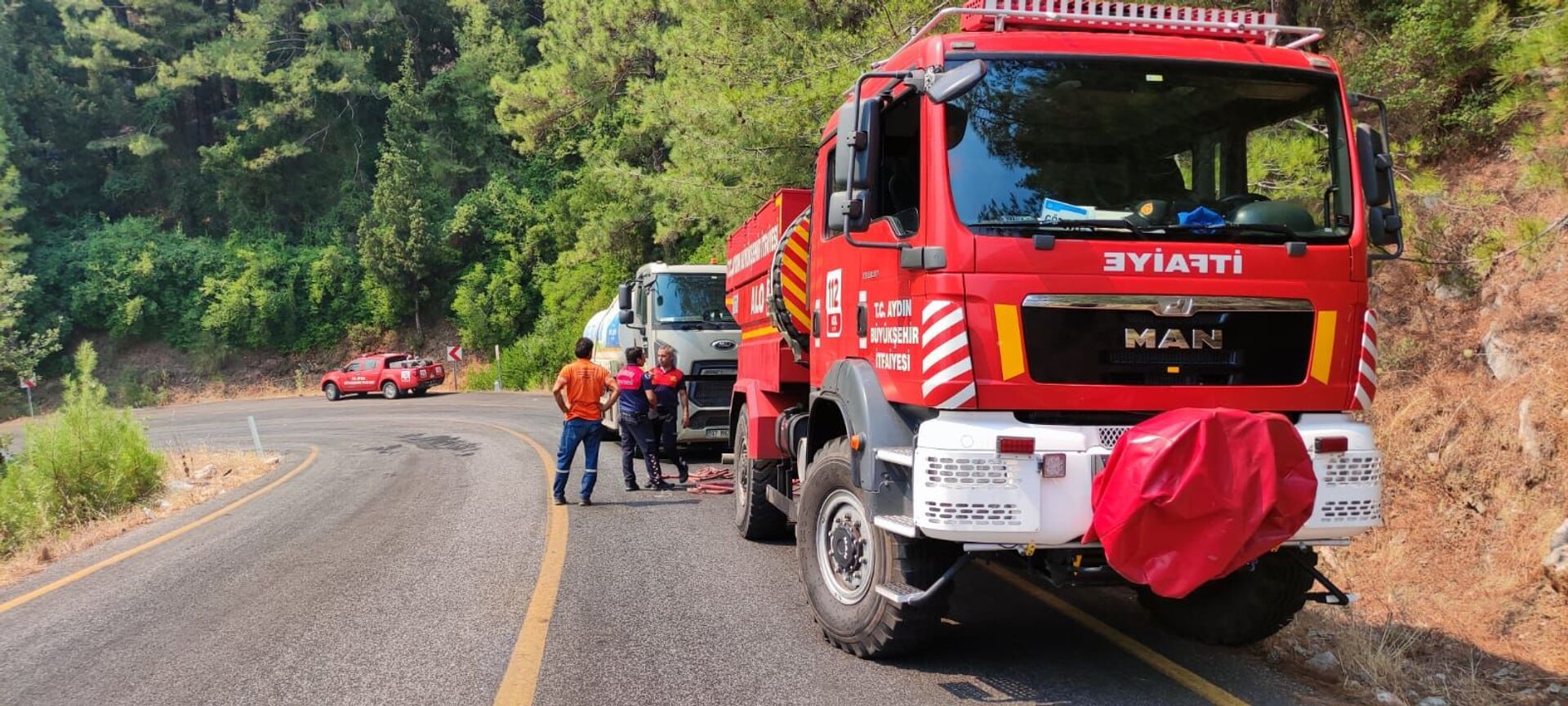
The situation in Marmaris, Turkey, amid nationwide wildfires
© Sputnik
Italy's Economy Won't be Crashed by Wildfires
Meanwhile, a whopping 800 flare-ups were recorded in Italy's southern regions this weekend alone. In Sicily, wildfires destroyed the local beach resort La Capannina and entrapped some 150 people in two seaside areas in Catania on Friday. Over the past three days, Italian firefighters have conducted hundreds of operations throughout the country, according to the national fire service.
"The impact of wildfires on the tourist economy has not been particularly studied so far," says Federica Montaguti, senior researcher at the International Centre for Studies on Tourism Economics at Ca' Foscari University in Venice. "In the case of Sicily too, so far, it is difficult to identify a relationship between the number and reach of 'wildfires' and tourist flows. In the last five years, the number of fires in Sicily didn't seem to impact on tourist trends."
The number of fires increased from 830 to 1,213 between 2015 and 2017 but that didn't seem to affect tourism, as tourist arrivals increased in number by 10 percent between 2016 and 2017 and by 3 percent between 2017 and 2018, she emphasises.
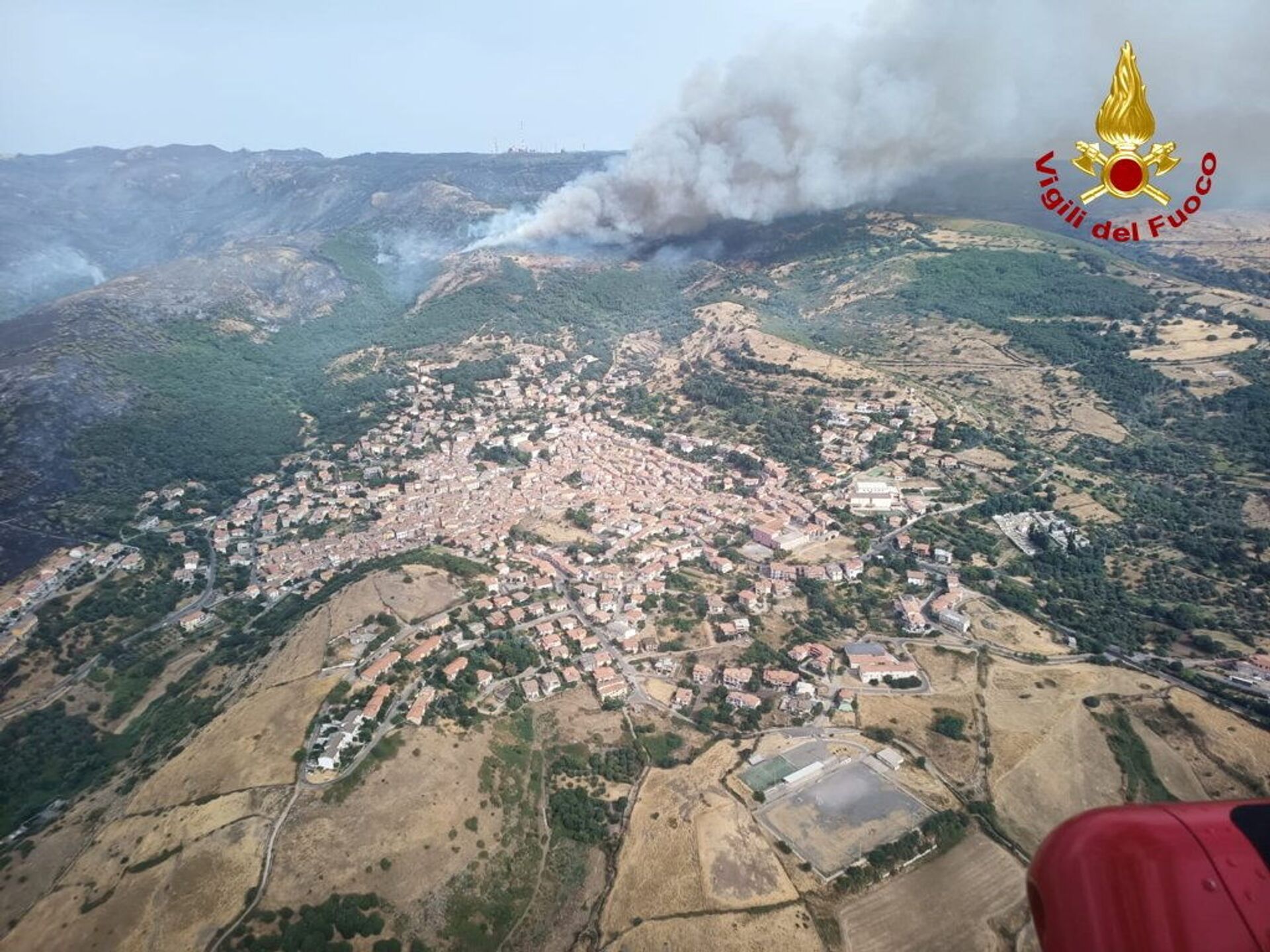
An aerial view from a helicopter shows a large wildfire that broke out near Santu Lussurgiu, Sardinia, Italy July 25, 2021.
© REUTERS / Vigili del Fuoco
The overall economic damage caused by wildfires is unlikely to upset Italy's economic rebound, insists Lorenzo Codogno, visiting professor at the European Institute of the London School of Economics and a former chief economist at the Italian Treasury Department.
"I think the economy is still doing very well," he says. "In the second quarter the GDP was up 2.7 percent, quarter on quarter. We do expect another jump in the third quarter. And that would bring GDP growth in excess of 5.5 percent this year."
The rebound from the pandemic and a series of government measures have helped keep the economy afloat, he relayed. Furthermore, he expects that the EU would sponsor new investment plans in the second half of this year which will also support the growth.
"Tourism is very important for Italy, but as a percentage of GDP, it’s a small bit," he underscores. "So all in all, I don't expect major economic damages there."
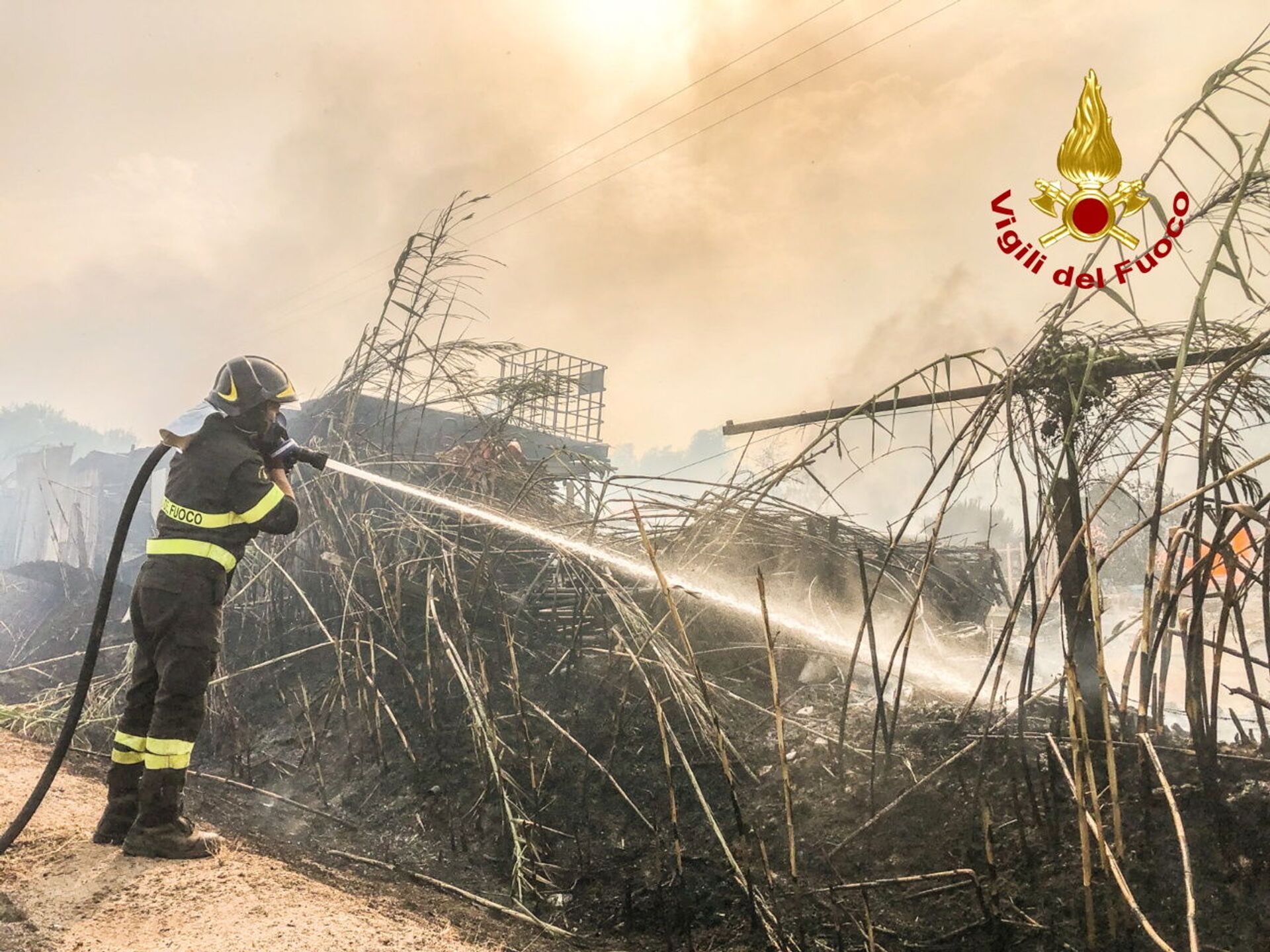
A firefighter battles the flames after a large wildfire broke out near Santu Lussurgiu, Sardinia, Italy July 24, 2021.
© REUTERS / Vigili del Fuoco
The Italian tourism industry saw a roughly 50 percent decrease in 2020: the share of GDP generated by tourism in Italy was seven percent, while it peaked at 13.1 percent in 2019, according to Statista. Nevertheless, in the second quarter of 2021 the country experienced the strongest rebound among Europe's major economies: the country's GDP rose 17.3 percent compared to a year ago, prompting Finance Minister Daniele Franco to suggest that Italy could regain its pre-pandemic size by the third quarter of 2022.

